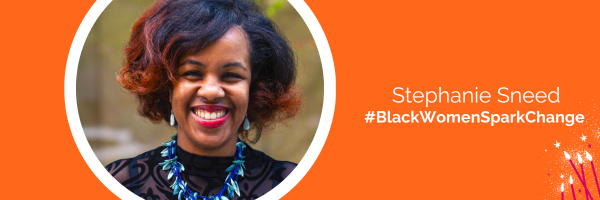
By democratizing budget and program information and allocations, Fair Budget Coalition gives constituents a voice in the most important conversations
After college, Stephanie Sneed dove right into an accelerated teaching program, taking over her own classroom just months later. “I didn’t feel prepared at all,” she says. “These schools required a lot—and not a single one ultimately made it. None are open now, unfortunately.”
Despite her initial experiences in the classroom, Stephanie planned to continue working towards a graduate teaching degree and certification. Then, her son was born and, simultaneously, the recession hit. Between her lack of certification and overcoming postpartum depression, Stephanie didn’t return to the workforce until her son was almost two.
“During this time I had different interactions with nonprofits, but this time as a constituent,” she says. “So when I went back to work I had discovered all of these new passions. I was a mom, and now I had a real view of things like food justice and food access. I wanted to really pursue that and see how I could impact change.”
Stephanie quickly went to work, first at the Capital Area Food Bank and then at the Latin American Youth Center. She spent three years at the youth center and during that time moved from direct service into management, grant reporting, and programmatic design.
“I was amazed at the work we did with Americorps,” Stephanie says. “It was very different than what I’d seen from Americorps programs before. We were hiring a lot of youth who were being, or had been, served by the Center. So they were deeply involved in the community and knew others we were serving—they were from the same neighborhoods and had connections to one another. That was really powerful and shaped how I wanted to move forward in the nonprofit space.”
With that vision, Stephanie left Latin American Youth Center and moved to the Fair Budget Coalition where, today, she serves as Executive Director. The coalition advocates for budget and public policy initiatives tied to poverty and human needs in Washington, D.C.
“When I got here I was initially shocked at the overwhelming whiteness—and the overwhelming whiteness in the advocacy space in D.C., in general. This is a predominantly Black city, and advocacy issues tend to impact Black residents at much greater levels—especially when we talk about poverty.” Quickly, she set to work ensuring these residents’ struggles were represented and that people directly impacted by these program budgets were more prominent parts of the conversation.
“A perfect example: go onto our website and you’ll see 20-page reports,” Stephanie says. “They’re important, but no one outside of budget work would read them. And what’s in those reports impacts so many people. For the last four budget seasons, we’ve rolled out both the longer reports as well as infographics that break down what’s important for people to know. We’re also committed to reporting being jargon-free so people can better understand them and how the budgets impact them and their lives.”
In addition, Stephanie and her team have established a constituent leadership program that provides budget training as well as space for people to share their concerns and advocate for change. Constituents can also help Fair Budget steer away from programs that they feel shouldn’t be as prioritized. As part of this program, participants receive a stipend, putting them on more equal footing with paid advocates who typically dominate these conversations.
“Budget work isn’t always the most appealing. But the things we advocate for in these budgets are what people care about. For example, we’ve seen calls for defunding police departments. That, ultimate, is a budget issue—that’s a great example of people looking at budgets more critically with an eye on how they can use them to impact change.”
Budgets, Stephanie notes, should be used as a tool for equity, with people understanding the connection between those budgets and the issues they care most about. “People tend to see issues with a band-aid approach. Now, though, we have an opportunity—more and more people are looking to impact change whether it’s taking to the streets or volunteering or working with a community group.”
Looking ahead, Stephanie and her team plan to continue fighting for better understanding and better access, so Washingtonians have a greater say in the budgets and allocations that impact themselves, their families and their lives.
“Ideally, someday, an organization like Fair Budget won’t have to exist, at least not in this capacity,” Stephanie says. “Someday, councilmembers will do the things that have the greatest impact on constituents. We all pay into the tax base and we should have more control over what comes of it. When that day comes, Fair Budget can be more of a convener where people can share ideas and recommendations. More importantly, though, when that day comes, this becomes a more affordable city where people can stay long-term—a city where everyone is housed and has their healthcare, food, education and transportation needs met.”
